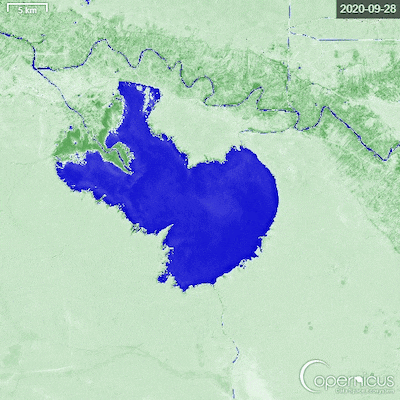Lake Habbaniyah, once a shimmering oasis of tranquillity and natural beauty west of Baghdad, has become a heartbreaking symbol of Iraq’s worsening drought and dwindling water supplies.
From 1970s to the 1990s, tourists flocked to the Habbaniyah resort to picnic under the shade of lush green trees, splash along the shores of the 140-square-kilometre lake, swim in its waters and ride boats across its vast expanse.
But over the past four years, the beloved escape from the scorching Iraqi summers has become a shadow of its former self. “Complete drought,” Ali Dawood, the Mayor of Habbaniyah told The National. “It [the water] became far from the beach. It was significantly affected in the past four years due to a drop in water levels,” Mr Dawood added.

Iraq has been experiencing its worst drought in decades, with temperatures exceeding 50°C in summer – mainly during the months of July and August. The country is ranked fifth on a list of countries most vulnerable to global warming, according to the UN. Desertification affects 39 per cent of the country and 54 per cent of its agricultural land has been degraded, mainly due to soil salinity caused by historically low river levels, rain scarcity and rising sea levels.
One of the most pressing issues is dwindling water flows in Iraq's main rivers, the Tigris and Euphrates, due to upstream dams in Turkey and Iran, mismanagement and environmental degradation. Decades of war and conflict have damaged the country's infrastructure, leading to water loss and inefficient distribution.
The fall in water levels at the lake, which is fed by the Euphrates River, has led to acute shortages of drinking water for the local communities living around it. As a consequence, local families have been forced to abandon their homes and seek refuge in other areas.
Today, the lake’s shores are completely dry and areas that were once covered with water have been replaced by sandy expanses dotted with sun-scorched scrub. As the lake is shrinking and no fresh water is coming from the Euphrates, the weeds are leaving a foul odour, Mr Dawood said.
The downturn in tourism has also dealt a blow to the local economy, he added. “We also have 3,953 acres designated for investment around Lake Habbaniyah, [but] many companies lost interest in investing when the water receded, and there was no desire for them to come,” he said.
For decades, Iraq has failed to convince both countries to reach agreements on how to ensure a fair share of water. Both argue that they, too, suffer from scarcity of water and that Iraq uses outdated irrigation methods.
The flows in Tigris are considered at good levels thanks to increasing water reserves at dams after abundant rains last winter unlike the Euphrates, an issue that “has political dimensions related to Turkey's stance towards Qasad [US-backed, Kurdish-led Syrian Democratic Forces] and the Syrian government”, said Aoun Diab Abdullah, Minster of Water Resources, in December.
During a visit by Turkey's President Recep Tayyip Erdogan to Baghdad in April, the neighbouring countries signed several preliminary agreements in different areas. That included a 10-year agreement on management of water resources that aims to ensure Iraq gets fair share of water flowing to its two main rivers, the Tigris and the Euphrates, Iraqis Prime Minster said at the time.
